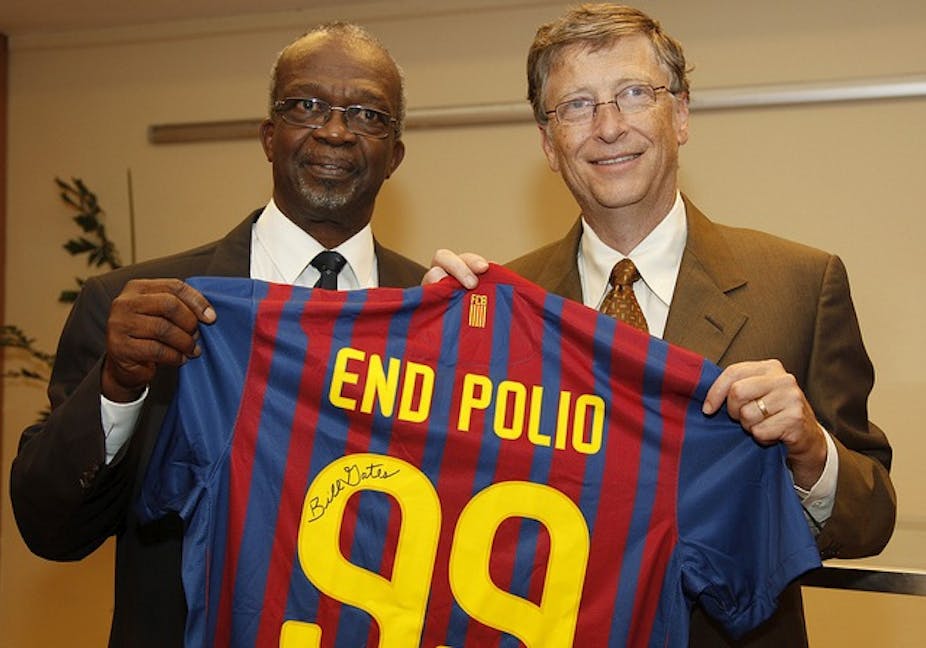Global health campaigner Bill Gates is in Sydney today to lobby prime minister Julia Gillard to spend more money on global health, particularly the fight against malaria and polio. But while money may indeed further efforts toward malaria’s eradication, the case of polio is a bit more complicated.
The killing of more than 20 polio vaccinators in Pakistan and Nigeria during the past six months has signalled a potentially crippling setback to global efforts to eradicate polio. Only a high level of political commitment to ensure health workers remain safe will enable the program to succeed.
Commonly known as polio, poliomyelitis can kill or cause lifelong paralysis. The highly infectious virus that invades the nervous system mainly affects children under the age of three.
The global polio eradication initiative launched in 1988 is extremely close to victory. When the initiative began in 1988, the illness paralysed or killed 350,000 people, mainly children, every year. Last year, there were just 223 cases worldwide (less than 0.1% of the 1988 caseload).
All but six of these were in the three countries where polio is endemic, meaning that they have never managed to interrupt polio transmission – Afghanistan, Pakistan, and Nigeria. (The other three cases were in Chad, Niger, and the Democratic Republic of Congo.)
All but three
We have the tools to eradicate the polio virus. Most countries have done so through the routine vaccination of children with three doses of an oral vaccine. This effectively builds immunity to all three strains of the virus.
What’s more, new vaccines were developed against specific virus types that helped children build immunity in areas where water quality, sanitation, and hygiene are poor. And where the bacteria that infect their gut interfere with the body’s ability to mount an effective immune response to the traditional vaccine.
This was the case in the last reservoirs of polio in India – the impoverished and densely populated districts of Bihar and Uttar Pradesh. Along with a major campaign by the Indian government to improve water and sanitation and a mass communications strategy that effectively mobilised communities to vaccinate their children, these new vaccines helped India to finally eradicate polio in 2011.
In Afghanistan, Pakistan, and Nigeria, the two major obstacles are insecurity due to armed insurgencies and misinformation about the vaccine leading parents to refuse to have their children vaccinated.
Afghanistan and Pakistan
This year, Afghanistan reported just two polio cases, both imported from neighbouring Pakistan. Most cases have been in the southern provinces of Helmand and Kandahar where anti-government elements have not permitted access by vaccination teams to communities under their control.
But just a fortnight ago, the Taliban in Afghanistan released a statement supporting polio vaccination campaigns.
In Pakistan, the legacy of the “fake” vaccination by the CIA of one of Osama bin Laden’s sons has been a widespread belief that polio vaccination is a “western plot” against Pakistani Muslims. To make matters worse, drone attacks have led the Pakistan Taliban to issue a ban on vaccination in North and South Waziristan.
To counteract anti-polio propaganda, the Crown Prince of Abu Dhabi has sponsored visits to Pakistan by leading Islamic scholars in the Middle East. And despite the killing of 14 polio workers since December 2012, Pakistan was able to mobilise 250,000 volunteer vaccinators during the last national campaign.

Nigeria
Most recent cases of polio in Nigeria have been reported in the north-eastern states where health workers have been targeted by the radical Jihadist group Boko Haram.
Nigerian President Goodluck Jonathan has imposed a state of emergency in three of these states and an offensive by Nigerian forces was launched last week.
Anti-vaccination propaganda DVDs have been widely disseminated in the north of the country leading to a massive pro-vaccination media counter-campaign.
Giving to get ahead
Despite some fatigue, the world continues to generously support the polio eradication program. At The Global Vaccine Summit in Abu Dhabi in late April, US$4 billion was pledged, much of it from Islamic countries.
New private donors included the Mexico-based Carlos Slim Foundation. Nevertheless, there remains a shortfall in the budget 2013-2018 of more than $1 billion. This is most likely the gap that Gates is here to try and fill.
Political leadership remains strong in the three remaining endemic countries. There has also been a major effort to mobilise Islamic scholars to support the program by adressing parents’ fears. The International Islamic Fiqh Academy has issued a call to parents to “see to it that their sons and daughters get vaccinated against polio”.
A subsidiary organ of the Organisation of Islamic Cooperation, the Academy strongly condemned acts of violence against vaccinators and noted that vaccination against polio is an “obligation”.
Taking it to the end
History shows how cruel polio can be; it resurges more easily than it is contained. When armed conflicts lead to a cessation of vaccination activities, it doesn’t take long until population immunity to the poliovirus declines to dangerous levels.
This was demonstrated last week when the first polio case since 2007 was reported in Somalia. The case was the result of the several years during which Al Shabaab militants forbade child vaccination in the zones that they control.
We could be witnessing polio’s last stand. But how long the illness will take to die out ultimately depends on the dedication and courage of thousands of volunteers in largely remote and insecure virus reservoirs.
Gates’ persistence and commitment to eradicating polio is significant but fund-raising is only one side of the equation. The polio eradication program will achieve its goal if it focuses on accessing children in the remaining polio “sanctuaries” and rebutting unfounded and unscientific claims about the vaccine. This requires innovative and locally relevant communication strategies supported by high-level political commitment.

